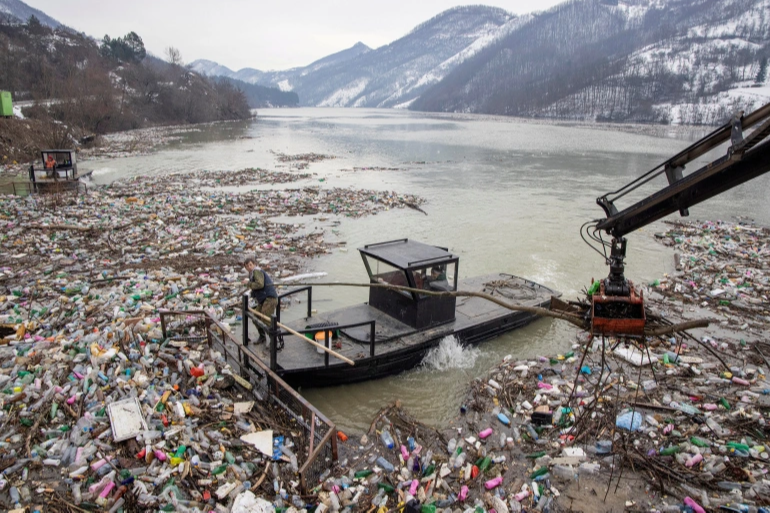
A worker collects plastic trash that litters the polluted Potpecko Lake near a dam's hydroelectric plant near the town of Priboj, Serbia
Montevideo, December 5 (RHC)-- The first round of negotiations on a global treaty to halt plastic pollution has ended in a split on whether goals and efforts should be global and mandatory, or voluntary and country-led. More than 2,000 delegates from 160 countries met in Uruguay for the first of a planned five sessions of the Intergovernmental Negotiating Committee (INC), a UN negotiating body aimed at crafting the first legally binding agreement by the end of 2024.
Negotiations in the coastal city of Punta del Este that ended over the weekend pitted a “High Ambition Coalition” against countries that have the world’s top plastic and petrochemical companies, including the United States and Saudi Arabia.
The High Ambition Coalition of more than 40 countries, including EU members, Switzerland, host Uruguay and Ghana, pushed for the treaty to be based on mandatory global measures, including curbs on production. “Without a common international regulatory framework, we will not be able to address the global and increasing challenge of plastic pollution,” Switzerland said in its position statement.
The opposing camp wants the pact to resemble the structure of the Paris climate agreement, where countries set their own greenhouse gas reduction goals and action plans. They argue national plans allow governments to prioritise the most important sources and types of plastic pollution.
“The United States is committed to working with other governments and stakeholders throughout the INC process to develop an ambitious, innovative and country-driven global agreement,” a US State Department spokesperson said in a statement. Industry representatives at the talks touted the essential role of plastics in daily life, calling for the treaty to focus on tackling waste rather than measures to sap production.
“At the end of the day, we hope the committee comes to the same conclusion we do, which is that increasing recycling offers the best solution to reducing plastic waste,” said Matt Seaholm, the president and CEO of the Plastics Industry Association.
UN Secretary-General Antonio Guterres sent the opposite message, urging nations to crack down on the production of plastics, which are “fossil fuels in another form.” “I call on countries to look beyond waste and turn off the tap on plastic,” he wrote on Twitter.
Environmental group Greenpeace said that without a strong treaty, plastic production could double within the next 10 to 15 years, and triple by 2050. Nature conservation group WWF expressed concerns that a voluntary, country-led approach would fail to produce real change.
“Although in the minority, there are some powerful opponents of global rules and standards, which risk potentially weakening obligations on countries to take action,” Eirik Lindebjerg, WWF global plastics policy lead, said.
The Intergovernmental Negotiating Committee was established by the United Nations Environment Assembly to develop the text of a global agreement on plastic pollution. The move followed a meeting in Nairobi in March when UN members adopted a historic resolution to end plastic pollution.
Governments agreed to start working on a global, legally binding agreement addressing the full lifecycle of plastic that will come into effect in 2024, but differed on leading issues, including whether to limit plastic production, phase out types of plastics and harmonise global rules.
Negotiations began on November 28 in Uruguay. The EU called for a second round to be held “not earlier than late April 2023” to ensure sufficient time between sessions.

